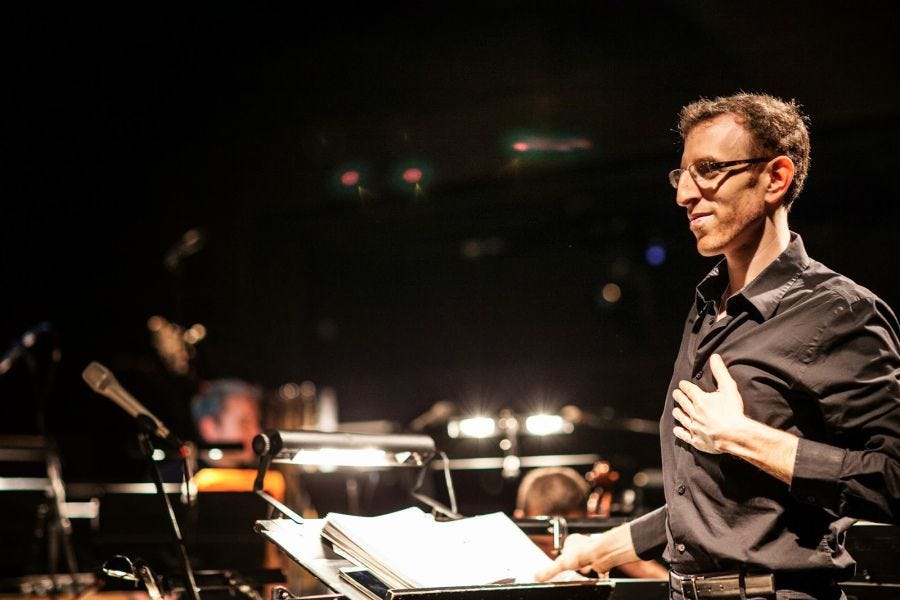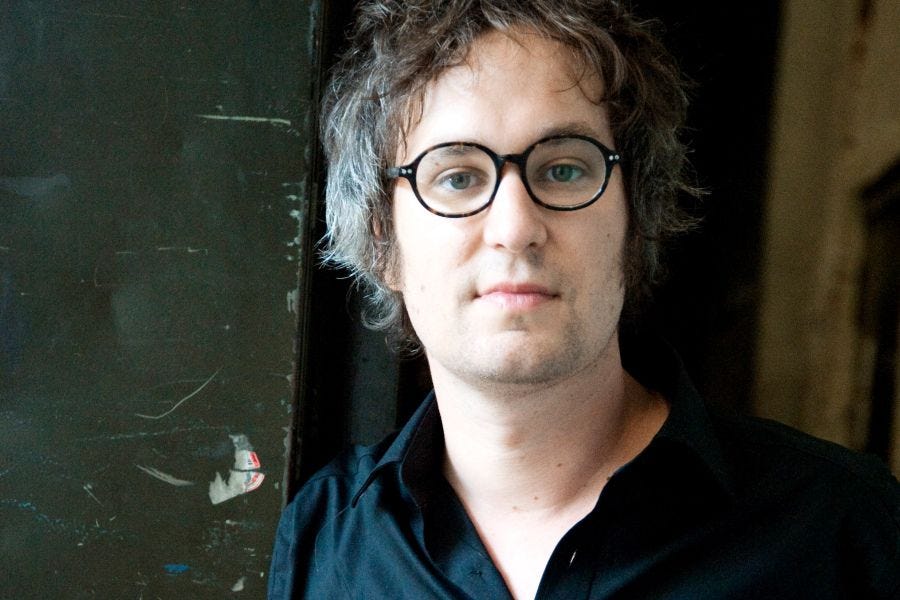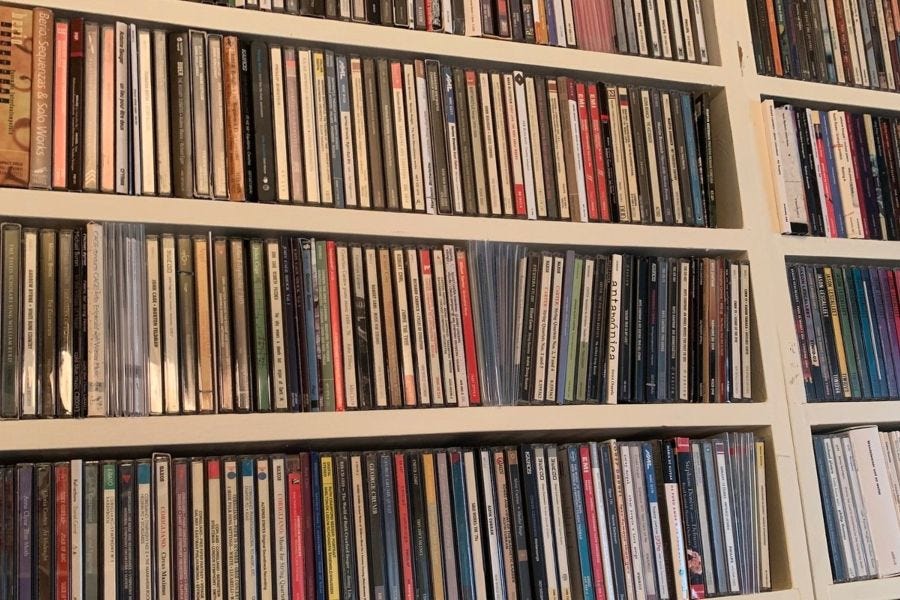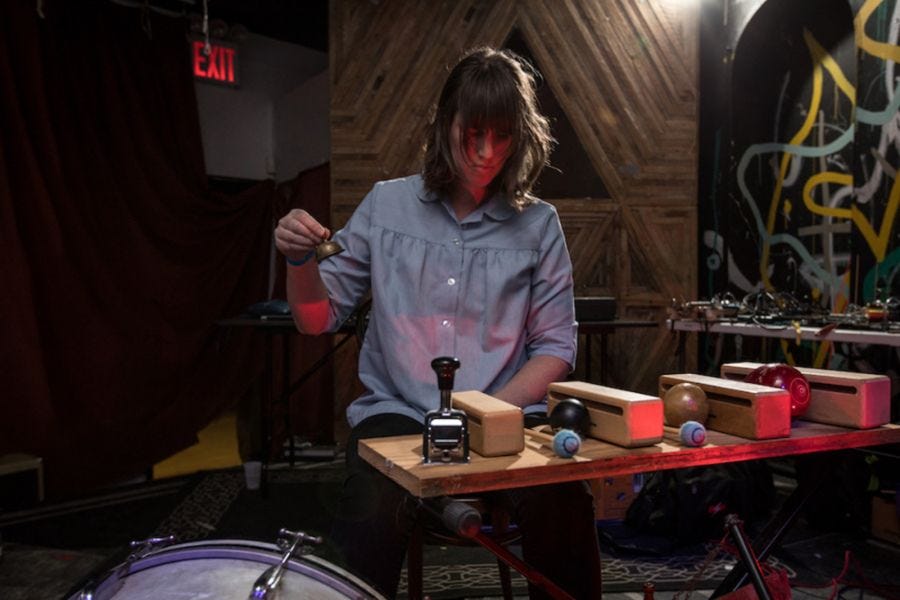Alarm Will (Re)sound
As Alarm Will Sound returns to public performance today, artistic director Alan Pierson talks about experiences abroad and bold initiatives at home. Plus, new recordings for Bandcamp Friday.
Cause for Alarm: An Interview with Alan Pierson
“The new-music ensemble Alarm Will Sound built its reputation on innovation and disruption, and those qualities have persisted in the group’s COVID-era projects.” Quoting myself in another publication is peculiar, but I chose my words carefully for a listing I wrote recently for the Goings On About Town section of The New Yorker, previewing a new online project and two new live-in-person concerts by the ensemble.
On the phone last week, I spoke to Alarm Will Sound artistic director Alan Pierson about both of those initiatives: Video Chat Variations, an online performance-video series for which the ensemble so far has commissioned works from Meredith Monk, Tyshawn Sorey, and David Lang; and in-person presentations of Ten Thousand Birds, a large-scale work by John Luther Adams meant for spatialized outdoor performance, mounted with appropriate precautions in two upstate New York venues. (Earlier this summer, Pierson and Alarm Will Sound released a video re-imagining of that piece, Ten Thousand Screens, on YouTube.)
Video Chat Variations debuted on August 1 with the world premiere of Monk’s luminous, meditative Anthem, the final event in the annual Mizzou International Composers Festival. That video is included in this newsletter, shared with the public for the first time since its premiere last weekend.
The live concerts take place this afternoon and evening at PS21 Chatham, and on Sunday at ArtPark in Lewiston—and all three will stream live on Facebook.
But prior to discussing those endeavors, we took a quick detour to Germany, from where Pierson had just come home after rehearsals of a new opera—having shared on social media the considerable hurdles he’d confronted just to lift off…
STEVE SMITH: I want to start by living vicariously through your recent experience: What was your trip to Germany like?
ALAN PIERSON: Oh, man, it was so cool. I was really shocked by the exhilaration of suddenly being in a place where life felt kind of normal and safe. Yes, there are precautions being taken, and those precautions can be inconvenient, but the things that we do as part of normal life can still happen. It felt so different; just walking the streets was like a totally different reality. I really felt like I was exhaling for the first time, after four months in Brooklyn.
Ah, but the question is: did you inhale?
[Laughs] Yes, I did. I did inhale.
Where were you, exactly?
Mannheim, at the National Theater.
Let’s talk a bit about Dark Spring, the project you were working on.
It’s a new opera by Hans Thomalla. Do you know his work?
I do. And now that you’ve mentioned him, I’m also remembering that you posted a picture of him at the airport on social media. As I recall, it was one of the instances where you actually weren’t allowed to fly out that day.
[Laughs] I’m impressed you remember that! The opera is an adaptation of the play Spring Awakening. It’s very much organized in terms of songs—mostly solos, but there’s also a duet, a quartet. There are some scenes, but it’s very song-centered. It’s about these four kids and their coming-of-age experiences, and it’s beautiful. If you know Hans’s work, there’s a lot of it that I think will be really surprising. You do hear Hans’s admiration for Lachenmann and spectralism, but it’s very tuneful. It’s influenced by pop music and by minimalism and by Broadway, in a way that’s different from anything else of Hans’s that I’ve ever heard.
Okay, I’m really curious now! Who were the performing forces?
The band is mostly local musicians who are part of the opera orchestra, but then there were a few guests who came in from out of town, because of the hybrid pop/new music nature of the piece—he wanted an electric keyboard player and a sax player and a guitarist. The singers are a mix of people in the opera company, with a countertenor who sang the queer character in the show, who kills himself at the end – which is maybe a bit of a cliché now, but it’s still a powerful story – that singer came from out of town. It’s very much an international company and production; one of the singers is Swedish, one is from Australia, another one Israeli.
Did the company have to deal with staging in terms of social distancing, masking, or anything of that nature?
Yes. The director is named Barbora [Horáková Joly], and I was very impressed; we had a workshop back in the fall, where I got a feeling of what her production was going to be like, and she’s completely redesigned it for COVID limitations. It was moved into a larger space, and there are very strict rules. The virus is much less of a day-to-day threat, because transmission rates are so much lower, but they’re very serious about precautions. Every single room in the opera house is marked with a sign on the door that says how many people are allowed in the room. In all the rehearsal rooms, it’s marked down with tape where the singers can be, and where other people can be so as not to be too close to the singers when they’re singing. The rule of the staging is that anytime someone is singing, nobody can be within six meters of them in the direction that they’re singing.
That must have been a challenge.
It’s really hard, and Barb did an amazing job of reconfiguring the staging to create a feeling of connection despite those limitations. It’s very clever. Her staging has a theme of social media, and the way in which kids, because of social media, are always performing. There are only four performers, and in addition to singing, they’re also operating cameras throughout the show, filming themselves and each other. There are a couple of very intense scenes in the show between characters, and in a couple of them she has the characters in these boxes that keep them physically separate. But they’re filming each other, and the video is projected in real time, so that it looks like they’re like right next to each other, singing.
You’re still rehearsing the show and putting it together, correct?
Yes, this was rehearsal. Because of COVID-19 challenges, the set has been a little behind schedule. But basically, the idea was that we were doing the production with staging, lighting, sets, and costumes. Now we’re away from it for five weeks, and then we come back and have final rehearsals and six shows.
When is the official opening?
September 11.
In the meantime, you’re seguing back into life in the U.S.—and, amazingly enough, you have live performances ahead here, too. But before that, Alarm Will Sound has launched a new project called Video Chat Variations, and the initial premiere, with Meredith Monk, will have happened already by the time we share this interview. How was the project conceived, and how is it being enacted?
It came out of a brainstorming conversation that I had with a dear friend of mine, the writer Garth Greenwell, and [Alarm Will Sound executive director] Gavin Chuck. It was a series of conversations, months ago now, about what Alarm Will Sound could be doing to make music in this way. We came up with this idea of doing something where we would try to embrace the possibilities and the challenges and limitations of video chat, and work with composers who would use that to make art.
Then we started talking with composers about creating things for us, and the first people we talked with were David Lang and Meredith [Monk] and Tyshawn Sorey. In each of the conversations, I was encouraging them to think about ways that they could make work that wasn’t something that would just happen onstage, being done in this other medium, but rather something that was really made for the online way of making music in real time—which is hard, and which is different.
One of the things that’s made this particularly challenging – for me, this is a theme of the whole pandemic experience – is more personal responsibility. Things that I’m not used to having to do for myself, suddenly I have to do for myself. And we all had that experience around Video Chat Variations. We’re used to having a sound engineer who takes care of the mikes, and we just show up and we play, and that’s not the way it is now. Every member of the ensemble has to be responsible, in collaboration with Daniel Neumann, who’s our wonderful sound engineer, for figuring out their own setup, and setting up their microphone and their sound interface and their computer and all the software that’s required.
A lot of things went wrong the first time we gathered for our very first workshop, even though Daniel had worked with every player—and not just Daniel, but also Peter Ferry, our assistant director of artistic programming. The two of them worked with every member of the ensemble, one on one, to get their setups organized. But still, the first time we did it, we were in rehearsal on Zoom and on Jamulus, which is the audio platform that we’re using, for an hour and a half before we actually could start playing.
Oh, no…
Yup. I really commend Meredith, because Meredith is very much about human connection through music. She’s not someone who I associate with technology. And she was very cool, as was everybody, about being patient and understanding that this was a new way of working, and that things were going to go wrong, and it was going to take a while, and there were going to be challenges. Everybody really rolled with that.
By the time this conversation appears, the Meredith Monk piece will have streamed already. Are these events going to be archived and available in perpetuity, or is it a case of watch it when it happens or it’s gone, as in a live event?
We’ve been talking about that a lot, and the plan right now is that these will all live online indefinitely after the premiere. But it’s definitely something we think about. On the one hand, you want to make it available to anybody who wants to hear it, and on the other hand, there is something special about something that is only in the moment. That’s how I felt about Mad Forest, which was an Ashley Tata-directed production of a Caryl Churchill play. That was really impressive. There was a whole Times article about it, and I can tell you, “Oh my God, it was amazing—but sorry, Steve, if you didn’t see it, because that was it.” It was a real-time event, and it happened, and now it’s done. There’s something special about that, too.
Beth Morrison Projects is doing something similar with its pssst… series of limited-access salon events, the first of which actually also was created by Ashley Tata. There are hybrid models already emerging, as well, where in the case of a paid-ticketed event, you might have a 24- or 48-hour window of access, and then it’s gone. Caramoor and the Village Vanguard have adopted that approach. Your online presentations right now are available free of charge and unticketed?
That’s right. At least for the moment, that’s what we’re doing. But it is something we’ve talked about, and we’ll continue to talk. Peter Ferry is also a percussionist, and he’s been exploring the possibilities of online music making, and he did something I really love. It was a piece by Marc Mellits that he was premiering, that was written for him, and he scheduled like a dozen performances of it, but he wanted to limit each one to eight people or something like that. You had to buy a ticket, but then it was a limited size, and he did this really lovely thing where at each show he talked to the audience and introduced them to each other, and really tried to make a kind of salon feeling, remotely, which I just thought was really lovely.
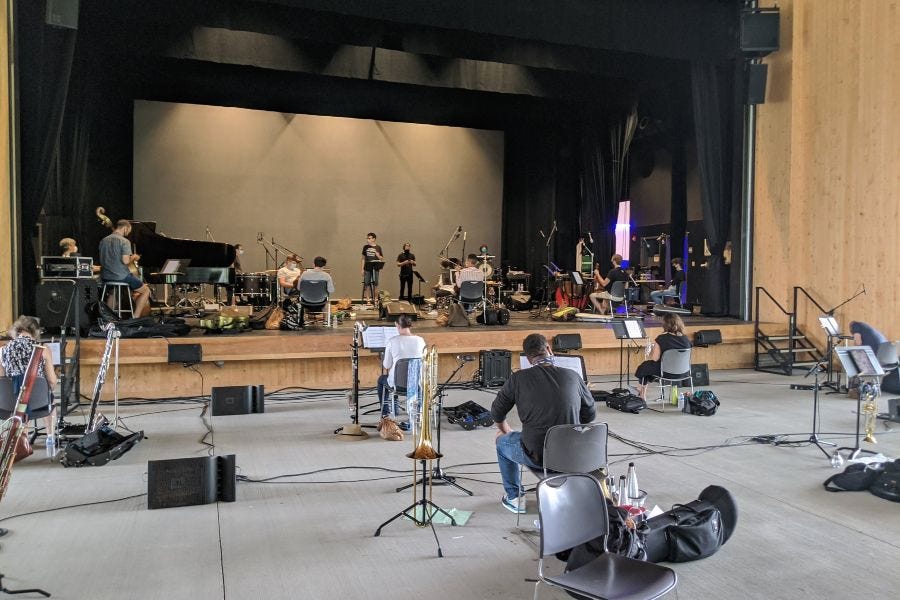
Now, the really amazing topic: Alarm Will Sound is about to perform live again, in front of actual audiences. How did these opportunities come about, and how are you approaching them in terms of logistics and precautionary measures?
These performances were both planned before the pandemic started. It’s kind of remarkable and pretty fortunate that we happened to have this piece, John Luther Adams’s Ten Thousand Birds, that is really amenable to a pandemic situation. Not only does it work with the players spread out, it actually benefits from it. It’s a piece that really wants to be in a big space, with the performers far apart and the audience among them. It’s about creating a kind of musical analog to the experience of walking in nature and hearing birds.
The only one of John’s big outdoor pieces I’ve experienced personally, as a viewer and as a performer, is Inuksuit. So I have a sense for the general mechanics of how this might work, but not the specifics.
A big difference between Inuksuit and this is that for Ten Thousand Birds, John didn’t really plan the structure of the piece. He created the materials, and then the structure is left up to the performers. I created the plan for who was playing which selections, when, and where in the space. I did that in 2014, when we performed the piece for the first time in St. Louis. And now, every time we bring it to a new space, Peter Ferry takes the lead on learning all about the space, and then taking the basic structure we created in St. Louis and figuring out how to map it onto this new space in the most effective way. Peter tries to learn as much about the spaces as he can, and then figure out what are all the nooks and crannies, where are all the places it would be interesting for a musician to go and play from.
There are two engagements coming up, and one involves a residency beforehand.
Yes, we’re going to be up in Chatham for five days. We’re doing a bunch of things. We’re working on recording some music by Tyshawn Sorey. We’re workshopping a bunch of new stuff. It’s a big deal for us, because it’s our first time to get together in a long while in person. Who knows when we'll be able to do it again? So we’re doing a bunch of different work, which will culminate in two performances of Chatham of Ten Thousand Birds, plus another event that Ashley Tata is creating with us, which is going to be Ashley’s own take on Ten Thousand Birds. Something that’s really cool about the piece is that because it is just this pile of material, these pieces inspired by birdsong that John composed, you can really do what you want, structurally. Ashley is going to take the same material and create something really different with it, and so we’ll perform that as part of an event called Follow Me Into the Field. Then we do our two performances of the Alarm Will Sound Ten Thousand Birds, and then we go over to ArtPark and do another performance there.
Let me ask you a straightforward logistical question, based in part on your own experiences trying to travel to Germany: What would happen if someone from Alarm Will Sound literally were prevented from getting to Chatham?
We have been doing so much work to try to make sure everybody can get there safely, and that everyone is safe when we’re there together. We’ve been trying to look ahead to every possible challenge. Gavin has been working overtime on all this stuff. He has been religiously keeping an eye not just on the New York state list of quarantined states, but also on the statistics that will inform which states will get added to that list, and trying to keep ahead of it. We’ve got a few players living in states that were going to go on the quarantine list, and Gavin has been getting players out of those states.
Also, we have a health and safety committee that has been working hard on Alarm Will Sound practices around social distancing. The plan at this point is that anybody who can will be in a mask. Wind and brass players are not playing in an enclosed environment at all. I feel very comfortable knowing that that Gavin and the committee are taking this very seriously, working very hard on these practices.
Incredible.
And then also, Gavin is taking the lead on the audience experience, working in collaboration with Peter and me. Because it’s a piece where the players move – and where in principle the audience can move, too – how do we plan out that motion so that it is clear where the players are going to play, and where the audience can go, so that there’s no danger of anyone affecting anyone else at any point?
Alan, I just have to ask: with all of this nightmarish stuff you have to go through to get the band out into the field, just to do these couple of performances for smaller audiences than you might’ve drawn under any other circumstances, what’s the incentive? Why are you doing it?
Well, my parents think that we’re crazy and should not do it. That is a valid point of view. [brief pause] Having just experienced it in Germany, I think coming back together to play music is going to be really cathartic. That’s worth a lot. Ten Thousand Birds is a really beautiful and emotional piece to perform, and I’m really excited to give people the experience. We’ve never done it in New York state; there was a New York City performance that was scheduled, and then got rained out. It’s a very, very impactful piece to experience live, and one you really can’t experience any other way.
John and I are thinking really hard about how we could make an album that would give something of the live experience, but it’s so much a piece that’s about community and the natural world and exploration, because the players are all around you in unexpected places. The audience has a lot of freedom to make their own experience of the piece by exploring the space in their own way. So it’s a really magical experience, and the opportunity to bring it to people in upstate New York, even for an audience that because of COVID limitations could be possibly smaller than it might otherwise be, feels like a really worthwhile experience to give people right now.
Alarm Will Sound performs Ten Thousand Birds at PS21 Chatham on August 7 at 4 and 7pm, streaming live on Facebook; and at ArtPark on August 9 at 6:30pm, also streaming live on Facebook.
For the Record: August 7, 2020
For the Record is a weekly round-up of new and pending recordings of interest to the new-music community: contemporary classical music and jazz, electronic and electroacoustic music, and idioms for which no clever genre name has been coined, on CD, vinyl LP, cassette, digital-only formats… you name it.
This list of release dates is culled from press releases, Amazon, Bandcamp, and other internet stores and sources, social-media posts, and online resources such as Discogs. Dates cited correspond to U.S. release of physical recordings, for the most part, and are subject to change. (Links to Amazon, where used, do not imply endorsement.)
After publication, new listings are incorporated into On the Record: The Master List, a continuously updated resource exclusively accessible to paid Night After Night subscribers, found here.
These listings are not comprehensive—nor could they be! To submit a forthcoming recording for consideration, email information to nightafternight@icloud.com.
New This Week
August 7 is a Bandcamp Friday, on which the online sales platform will forego its share of all sales in order to put more money into the pockets of artists and labels. Expect to find all kinds of new releases and special offers sitewide today. Consult Is It Bandcamp Friday? to determine when the sale is in effect in your time zone.
Asher - Arrangements I (Room40)
Beth Anderson - Namely (Other Minds)
Derek Baron - Curtain (Recital)
Bloodmist (Jeremiah Cymerman, Mario Diaz de Leon, Toby Driver) - Phos (5049 Records)
Suzanne Ciani - Music for Denali (Finders Keepers)
Henning Christiansen - SAVE THE NATURE – USE FLUXUS, The Box parking lot, Los Angeles - co-performances and tributes by Thorbjørn Reuter Christiansen, Bjørn Nørgaard/Mai Dengsøe Hansen, Mara McCarthy/Paul McCarthy/Chiara Giovando, and Mark Harwood (Henning Christiansen Archive/The Box LA)
Morton Feldman - Crippled Symmetry – at June in Buffalo - The Feldman Soloists (Frozen Reeds; digital version of 2012 CD release)
Michael Formanek Quartet - Pre-Apocalyptic (Out of Your Head)
Sarah Hennies - Waylaid (self-released)
Hierophant (Alex Van Gils, Alec Goldfarb, Carrie Frey) - Hierophant (self-released)
Robert Honstein - Soul House - Hub New Music (New Amsterdam)
James Ilgenfritz - Trust Fall - New Thread Quartet (Infrequent Seams)
Roland Kayn - Music for the Isle of Man (Reiger Records Reeks)
Federico Musso and Jessica Ackerley - Nervios calavera en roja cinta en una noche en bruma gualda (self-released)
Quinsin Nachoff - Pivotal Arc (Whirlwind Recordings)
Weston Olencki - that high lonesome sound (july banjo improvisations) (self-released)
Popebama - Nation Building - compositions and performances by Erin Rogers and Dennis Sullivan (Gold Bolus)
Julia Reidy - Vanish (Editions Mego)
Daniel Schmidt - Abies Firma (Recital; CD edition with bonus track)
John Mark Sherlock - for neither/nor (self-released)
Richard Skelton - Song to Vega (Aeolian)
David Virelles - Transformación del Arcoiris (Pi Recordings)
Newly Announced
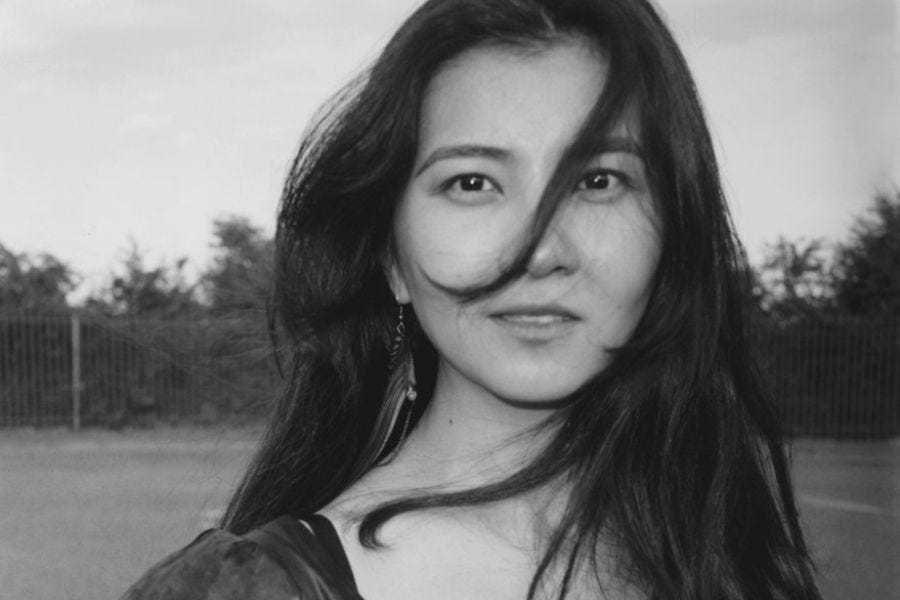
August 21
Missy Mazzoli & Royce Vavrek - Proving Up - Opera Omaha, International Contemporary Ensemble/Christopher Rountree (Pentatone)
August 28
Valance Drakes - Freedom Is Its Own Kind of Salary (laaps)
Liza Stepanova - E Pluribus Unum - compositions by Lera Auerbach, Kamran Ince, Chaya Czernowin, Reinaldo Moya, Anna Clyne, Eun Young Lee, Badie Khaleghian, Pablo Ortiz, and Gabriela Lena Frank (Navona)
September 4
Galya Bisengalieva - Arkalkum (One Little Independent)
Ian Power - Maintenance Hums - performances by Brian Archinal, Antoine Françoise, Luca Piovesan, Amit Dubester, Maarten Stragier, and Ian Power (Carrier)
September 18
Suzanne Ciani - A Sonic Womb: Live Buchla Performance at Lapsus (Lapsus)
New Hermitage - Unearth (self-released)
Andrew Weathers - Recordings with Guitar (Astral Editions)
Dan Weiss - Natural Selection (Pi Recordings)
September 25
Ricky Ian Gordon - Ellen West - Jennifer Zetlan, Nathan Gunn, Aeolus Quartet, Evan Premo, Djordje Nesic/Lidiya Yankovskaya (Bright Shiny Things)
Sarah Hennies - Casts (Astral Spirits)
Sarah Hennies - The Reinvention of Romance - Two-Way Street (Astral Spirits)
Christopher Parker & Kelly Hurt - No Tears Suite (Mahakala Music/Oxford American)
October 23
junctQín - reTHiNK - compositions by Monica Pearce, Emily Doolittle, Tomi Raisanen, Chris Thornborrow, Alex Eddington, Elisha Denburg, and others (Redshift)
Coming Soon
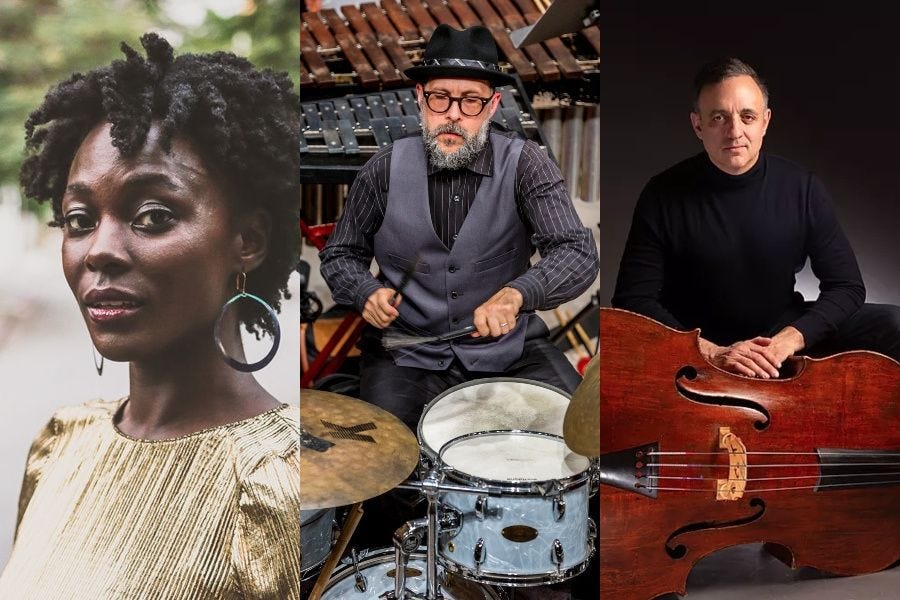
Nathalie Joachim, John Hollenbeck, and Gregg August – each a composer, an interpreter, and an improviser – discuss new projects and current concerns.



